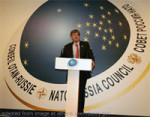Interfax: NATO silent on Russian efforts to bolster Euro-Atlantic security – Russian NATO delegation

(Interfax – May 13, 2015)
The Russian delegation to NATO has issued an analysis of Euro-Atlantic security, pointing to the causes of the military and political tensions in the regions.
“Recently, NATO’s information offices have persistently imposed their simplified black-and-white picture of the history of the difficult relationship between the alliance and Russia on public opinion, ascribing to Russia the myth-making about NATO’s ‘impeccable’ actions,” the Russian Delegation to NATO said in a review on “Russia-NATO: facts and myths” (available in Russian) ahead of a meeting of NATO foreign ministers in Antalya. [http://www.missiontonato.ru/news/725/. English version here http://www.missiontonato.ru/en/news/726/]
The authors note that “the alliance’s constantly updated material aims to convince that only NATO was bolstering European security and stability, and there was no space in (this material) for any critical self-assessment to the Alliance’s actions or the difficult lessons learnt from its military operations in the Balkans, in Afghanistan and Libya.”
Crucially, the NATO documentation does not propose a constructive agenda that would help overcome the current trends which might result in most serious risks to the military-political situation on the content, and has clearly maintained a wall of silence on Russia’s efforts to bolster Euro-Atlantic security architecture, the authors said.
The Russian analysis, which was presented both in Russian and in English, focuses on issues such as the removal of Soviet troops and weapons from Central, Eastern and Southern Europe and the Baltic States, Russia’s participation in multilateral efforts to bolster European security, including in the fight against terrorism and piracy and in the joint effort to ensure safe destruction of Syrian chemical weapons, to resolve crises in Kosovo and Transdniestria, in peacekeeping missions in Georgia-Ossetia and Georgia-Abkhazia conflict zones, in assisting the stabilization of Tajikistan and in the Karabakh peace process.
The document offers facts on the situation around control over conventional armed forces in Europe (CFE), the creation of the U.S. global missile shield, NATO enlargement and advancement of its military infrastructure eastward. The review describes Russian proposals on how to bolster European security, citing Russia’s defense spending figures and setting out data about NATO’s actions on “the eastern flank.”
One section focuses on the impact of the Ukrainian crisis on NATO’s cooperation with Russia.
The document’s final section – on the missed opportunities as a result of NATO suspending its cooperation with Russia – says that the alliance discontinued its trust fund for assistance in training ground personnel and parts supplies for servicing Mil Mi-17/Mi-35 helicopters of the Afghan army.
The document also mentions the scaled-down project to assist in training anti-drug specialists for Afghanistan, Pakistan and Central Asian countries and suspending the exchange of data under the NATO-Russia Council’s airspace control project.
Also mentioned in the final section is the freezing of a project to develop techniques for remote detection of explosive substances and devices on transport vehicles and during public events (the Standex project).
There is no exchange of information on the terror threats emanating from the Middle East and North Africa, the document says.
